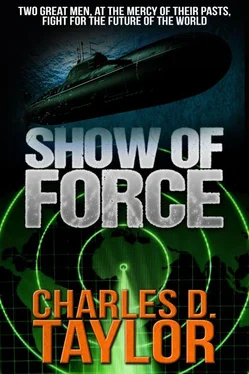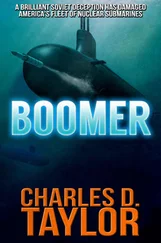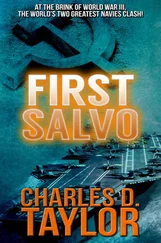They ate in a silence punctuated only by the sounds of the men completing the phone system. The communications officer was relieved, as they neared the end of their meal, when someone finally spoke.
It was Jasperson who broke the silence. "I assume this onetime code of yours is simple enough to learn."
"Yes, sir. There's a simple code word to let them know on the other end which one you'll be using. Right now, you want to prepare your message in as few words as possible, and I'll translate it to fit the code. As you prepare it here, you destroy the system. As they translate it there, the same thing happens. We'll simply have to read it to them on the landline, and that's why I suggest as few words as possible." He then took a few moments to instruct the Secretary.
Together, while the other men gave instructions over the phone for placing the call, Jasperson and Carter prepared their message. In as terse a statement as they could make, they attempted to inform Collier and the ambassador of the status of Islas Piedras, David Charles's task force, and the attitude of the President.
"I have the embassy on the line, gentlemen."
Secretary Jasperson reached for the phone, prepared to give his message as quickly as possible. "This is Secretary Jasperson. I have an urgent message for the ambassador and Admiral Collier."
A distant voice at the other end replied, "I am very sorry, sir, but they received word that Admiral Gorenko would talk with them and left only a few moments ago…" and then the connection was broken.
Jasperson's earlier statement was true. The phone had also rung in the Kremlin.
FROM THE LOG OF ADMIRAL DAVID CHARLES
Communications. They're something the Navy takes for granted and something I have always accepted as a natural adjunct to my job. Communications were provided by other people. I never had to worry. In a whaleboat off a Cuban beach, in a riverboat in Vietnam, wherever I've been, I've never had to worry about them. I've always been able to communicate when it's necessary.
Today, I continue to be out of touch with my seniors and my country via any kind of secure channel, voice, teletype, even the old Morse code system. And the computers that my command ship carries that are supposed to be in contact with War Games are as useless as a kitten. I'd always been made to understand that when it became evident in the sixties that our sophisticated electronics could easily be disabled by a single bullet, that everything was protected. There were simple methods of armoring1, equipment placement in the ship, cross-connected circuits that could bypass any failures, any number of methods that I could never understand. But no one ever considered the relay source of the signals themselves. The computers are useless unless they receive some input to generate information. A computer is only as good as the information provided for it, and the Russians have made sure that the source is useless by simply zapping a few satellites. The millions, maybe billions, of dollars spent to have instant access to anything War Games might be able to provide for a tactical situation are so much chewing gum on the sidewalk. I hope that right now someone back in Washington is thinking of a better mousetrap for the next war.
At least I have some advantages over Farragut and Dahlgren and some of the others. I don't have to rely on signal flags and line-of-sight communications. But my captains and I are as much on our own in making decisions as a company commander in the field. Our lives are dependent on our wits. We're back to making our own decisions again. That's what Sam has been pounding at me for years, and he couldn't have been more right. He is probably grinning right now in Washington, knowing just what the situation is. But now, he's part bureaucrat and he's probably tearing his hair out trying to get hold of me. If you ever read this, sorry for the inconvenience, Sam.
I don't like the situation I'm in either. Perhaps it's a bit of age showing, but the idea of meeting Alex in battle doesn't appeal to me. That belongs with King Arthur's knights or the old western gunmen. This showdown with friends, regardless of the situation, just isn't attractive to me, but I know both of us will continue. We've both been trained for this, and we'll do our jobs, but I wonder if he knows any more than I do why he's "gunning" for me?
Islas Piedras is a mystery to me. I don't absolutely know what it means to us or why the Russians are so anxious about it. And I'm sure not the type to question orders. I wouldn't be here unless there was a reason. John Mack told me the Navy always has a reason, but I just hope that damn island is important enough to make it all worthwhile. Perhaps the reason I need to know what it means is so that I can pass it on to my men. Most of them haven't been around as long as I have, and a lot of them need to know why they might die before they really have their heart in it. Sam Carter used to be so good about that, telling the troops what was happening from day to day, and they loved him for it. I don't need to be loved, but I sure do know what's going through their heads. Silence can be terrifying.
THE international damage was complete. The Party Chairman had made his speech. Enough preliminary groundwork had been laid so that it was distributed worldwide by most press syndicates within hours. The seeds of further distrust of America were germinating. The Chairman had shown proof that the United States was finishing a base for Trident submarines at Islas Piedras that would be a threat to not only the Asian subcontinent but Africa as well. Of even more significance, he saw a greater threat to the integrity of the emerging Third and Fourth World nations. Little more need be said. It had proved effective beyond even the Chairman's wildest hopes.
Now, Bob Collier knew, the Russians had bought time. The advantage was switching to their side. They didn't know exactly the stage of launcher completion on Islas Piedras, but they knew it wasn't anything as simple as a sub base. The Americans saw the value of the Indian Ocean and its sphere of influence in a world grown miniscule. Gorenko had explained it briefly and to the point to his inner circle of decision makers, and they had given him the authority to protect their interests.
World opinion was to the Russians' advantage now, too, and they would not release any information about the clash of the opposing fleets off Islas Piedras. Since the U.S. needed time to complete their installation on the island, the Russians would now use the rest of the world to force the Americans to bargain, while their task force under Admiral Kupinsky kept the United States at bay. Although the Russians were unable to communicate in secret with their own forces, they had successfully compromised the American communications with both Task Force 58, and the embassy in Moscow.
The chaos created by the inability of either Washington or Moscow to contact their surface forces securely was a boon in other ways.- Neither American nor Soviet officials cared to make public the clash in the Indian Ocean. For almost forty years, the two superpowers had been threatening each other on land and sea, matching missile for missile, ship for ship, atom for atom. Yet for all their, posturing, there had been little damage or loss of life between them. While the rest of the. world had feared the worst if the two countries should ever begin to shoot at each other, mutual understanding of the destructive forces in their stockpiles negated the possibility.
So, it was better that this show of power that had already advanced into a contest of weapons and wills was being fought in a remote part of the world. And the fact that communications were nonexistent kept knowledge of the struggle between the contestants for the time being. The two nations could survey the flow of battle via photo satellites or high-flying spy planes, with no foreknowledge on the part of the other nations of the world.
Читать дальше












